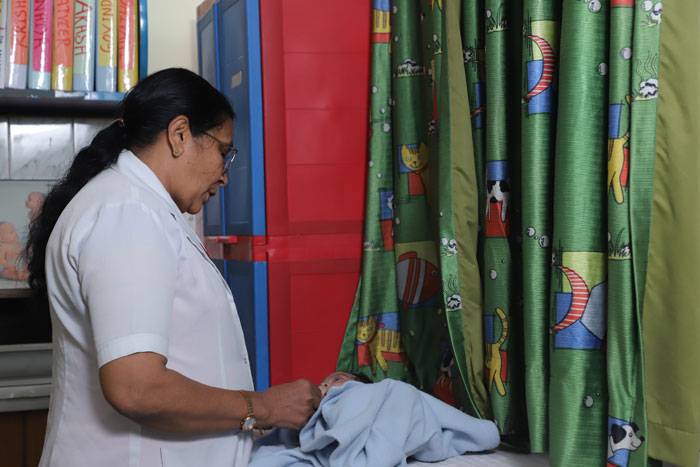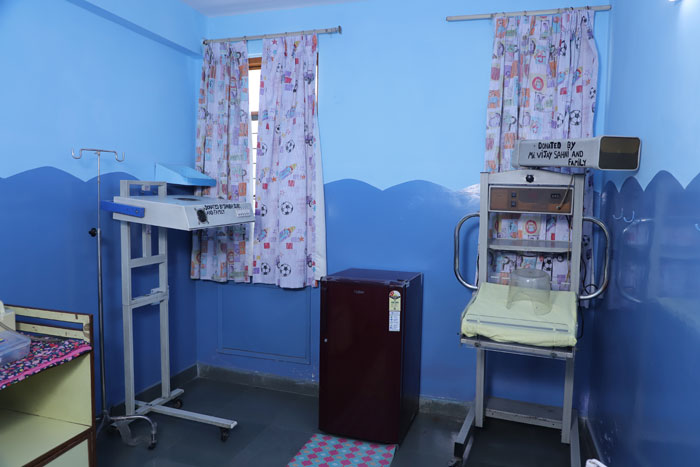- welfare2007@gmail.com
- +91-011-2697-4702 / 03
Unlike a child born biologically to a family and integrated organically, an adopted child and adoptive parents start their journey with the fundamental need to bond and come together. The child and the parents need help on this life changing journey with unique challenges that are not limited to parenting. The situations need to be handled with care, empathy and sensitivity. WHC has qualified and experienced professionals to provide counselling for both parents and child in pre-adoption and post adoption stages.
The Counsellors are also engaged actively for vulnerable children who have arrived under disturbing situations or from dysfunctional homes. Counselling is an integral and critical component of the adoption program and remains a focus area for WHC


There is medical room and a mini clinic where an experienced and qualified nurse and MBBS doctor is available to tackle any medical ailment or emergency. All the children follow a routine check-up and medical record is maintained on a weekly basis. We have a neonatal intensive care set-up in the home with two Photography Units, a suction machine, nebulizers, infusion pump and two oxygen cylinders. We have a sick room / isolation room for sick older children. As soon as the baby is received, he/she is examined within 24 hours and routine investigations like Hbps, VDRI, HI and HbsAg are done.
Early stimulation refers to a series of activities and exercises aimed at development in all the areas of development, which are Physical, fine motor, cognition(understanding), language (receptive & expressive), social-emotional & Activities of daily livings(ADL’s). In other words, early stimulation is important as its goal is to provide children with a variety of opportunities in which they can explore and so acquire skills and abilities spontaneously.
Experts say that these strategies work best when there are more neuronal connections. This occurs immediately after birth to 4 years maximum. As a result, it’s important to begin newborn stimulation as soon as possible and hence keep monitoring the all areas of development since from the beginning (immediately after birth or when the new born or child bought to the home). It begins with assessing baby/child in all the areas of development and hence providing age appropriate stimulation. Speech therapy focuses on receptive language, or the ability to understand words spoken to you, and expressive language, or the ability to use words to express yourself.
Speech therapy is used for children who have difficulty in speaking certain words or are not showing any interest in speaking. This form of therapy uses exercises to help enhance the ability of the child to speak. The reasons for speech impairment are many. The child may have undergone extreme trauma which delayed the verbal process of speaking, or he may have a genetic syndrome that delayed his speech. Speech therapy works on the child’s speaking ability in order to strengthen it and enhance it.
Speech therapy also addresses the mechanics of producing words, such as articulation, pitch, fluency, and volume. Some children only need help with language, while others have the most problems with the mechanics of speech. Some kids need help with multiple facets of speech, language, and swallowing.
At present children are undergoing therapy to develop vocabulary, word function, articulation development etc.
Children residing in welfare home often face numerous challenges which include emotional trauma, social isolation, and developmental delays. While these difficulties can have a profound impact on their well-being, music therapy emerges as a powerful tool for nurturing their emotional, cognitive, and social development.
Emotional Resilience: Children often grapple with complex emotions stemming from their surroundings. Music therapy offers a safe outlet for emotional expression, helping them process and cope with their feelings faster than any other means. Music helps them to switch their moods and complex situations rapidly and swiftly.
Self-Confidence: As children develop musical skills and achieve small victories in music such as singing or strumming/playing instruments their self-esteem blossoms. This newfound confidence extends beyond music, positively impacting their overall self-worth.
Communication Skills: For our tiniest members there are difficulties with communication, as their expression is most of the time ‘crying’ but music therapy becomes a bridge with blabbering and improvising little sounds in conversations.
Through rhythm, melody, and non-verbal extended voice expression, children learn to communicate effectively, fostering connections with therapists, peers and attendants.
Cognitive Growth: Engaging with music sharpens cognitive functions like memory, problem-solving, and creativity. It’s a versatile tool to cater to the diverse learning needs of our little ones.
Social Integration: Music sessions encourage teamwork and cooperation. Bonds formed through shared musical experiences and participation in musical events alleviates feelings of isolation often experienced by our children.
Stress Relief: Music’s soothing qualities reduce stress and anxiety. It creates a comforting, predictable routine for children who’ve faced instability.
Language Development: The most effective reason for conducting Music therapy sessions is to aid language development which improves articulation, vocabulary, and expressive skills.
In our welfare home, music therapy isn’t just about melodies and rhythms; it’s about fostering an ability to get equal opportunity like any other child, for a healthy and brighter future.
Besides these we also have a Yoga/ Physical Education instructor who makes sure children do some kind of physical training every day for an all-round growth.

1B, Institutional Area, Sarita Vihar, New Delhi-110076
We are registered under Ministry of Corporate Affairs for undertaking CSR activities. All donations to Welfare Home for Children are tax exempted under section 80G and 12A of Income Tax Act 1961.